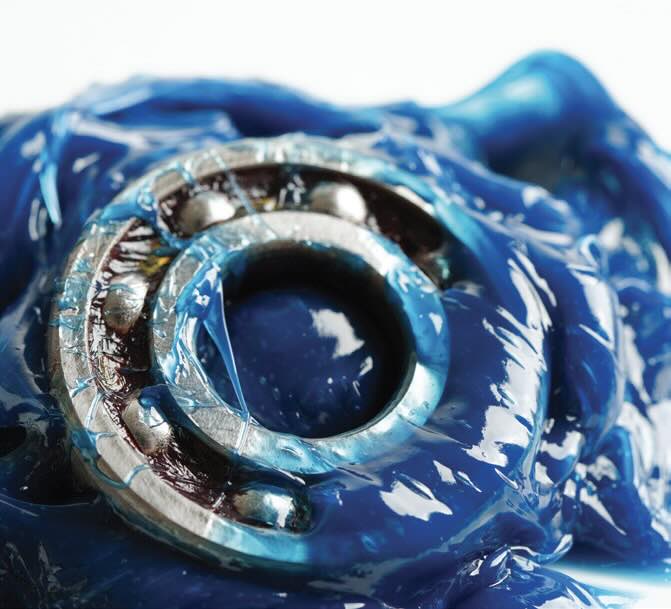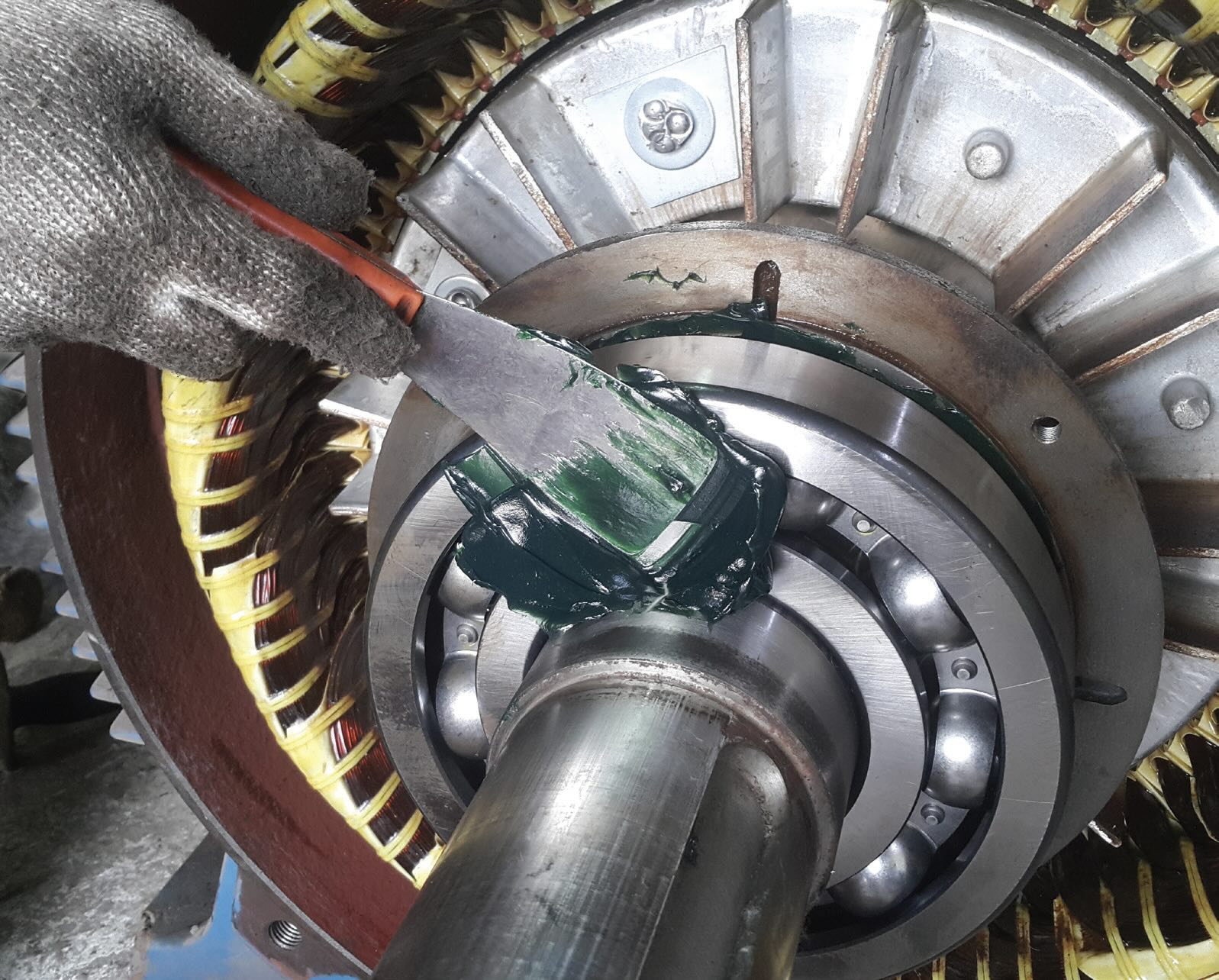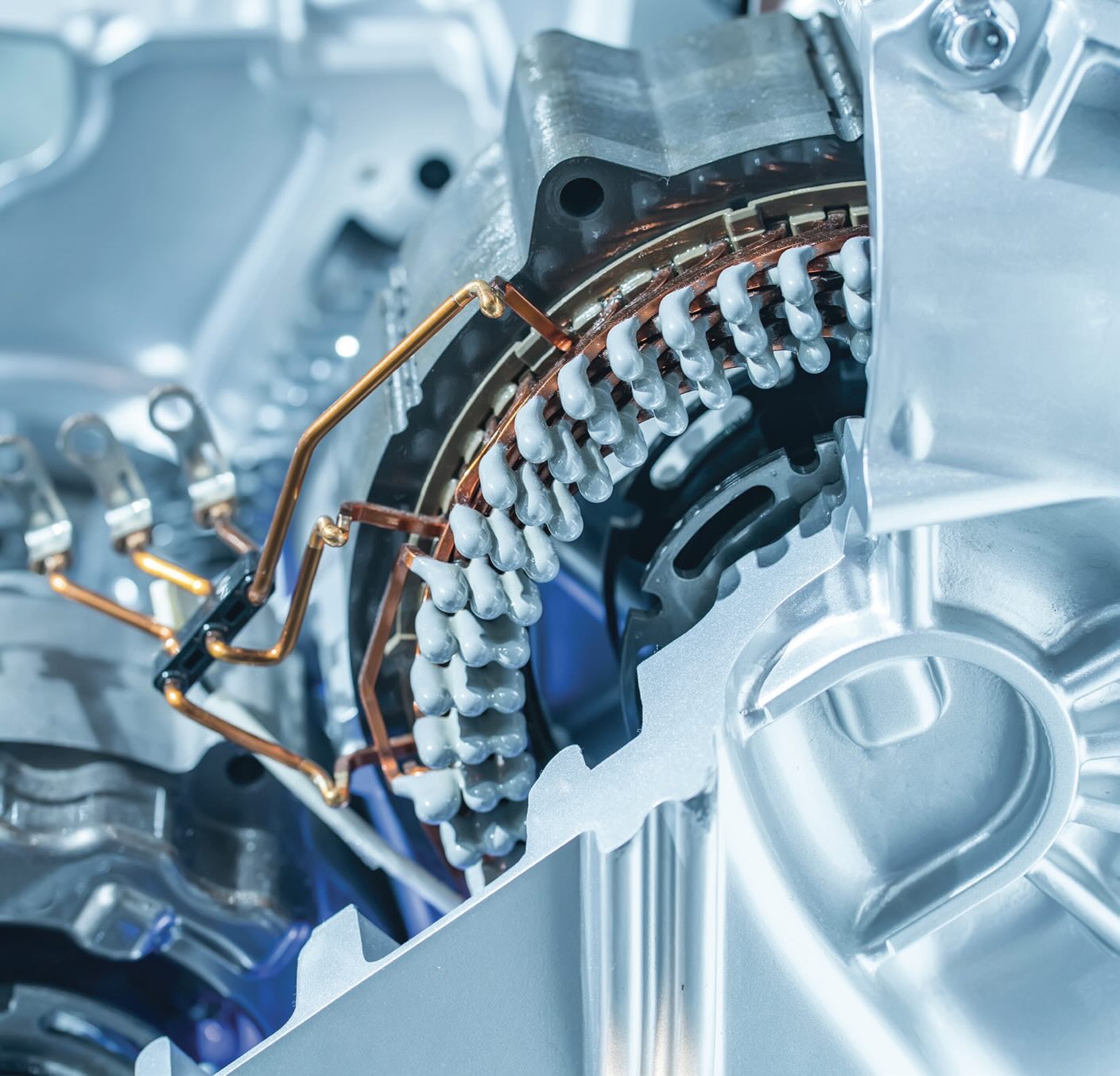Executive Summary
According to readers, the effects of electric fields on greases in electric vehicles (EVs) are complex and depend on factors such as grease formulation, operating conditions and the presence of electrical discharges. Electrical discharge can lead to many issues including oxidation, degradation and negative changes in grease properties, but this can be avoided with properly formulated greases. Most readers agree that achieving an optimal balance in grease conductivity can ensure the reliability and longevity of a bearing system.
Q.1. In EVs, what are the effects of electric field on the properties or characteristics of greases?
Conductivity of the grease.
Lubricating grease may not be exposed to an electric field. Lubricating grease is normally used for chassis, leaf springs and wheel bearings. The location of these applications is probably beyond the reach of a weak electric field. Actually, I do not know the EV to be more specific.
Grease can get hot like cooking in a microwave oven.
The overall kilovolt needs to be high as in semiconductors. The grease needs to absorb some electrical shock, otherwise the shock would break down the grease.
Increased chance of micro-arcs may accelerate grease degradation. In the case of ferromagnetic particles in grease refining packages, undesirable agglomeration of these particles may occur.
Oxidation.
Electric fields can cause grease to decompose or even carbonize. However, this is sort of after the fact because the bearing will already be damaged by the current if arcing occurs causing fluting or pitting of the bearing surfaces. The electric field can also cause micro-bubbles in the grease that can interfere with the elastohydrodynamic (EHD) film. The electric field is just one problem for the grease and bearing to handle. EVs have higher motor and gearbox bearing speeds that cause more churning of the grease leading to higher operating temperatures and shearing of the thickener. EVs typically are heavier than internal combustion engine (ICE) vehicles so the grease must handle heavier loads, especially wheel bearings.
From my standpoint the presence of electric fields (E) impacts the properties and performance of a grease. By example the E can influence the EHD film formation, altering the grease’s ability to maintain adequate separation between surfaces under load in bearings and gears. Also, a prolonged exposure to strong electric fields can degrade the grease’s dielectric properties, potentially leading to dielectric breakdown. This may compromise the grease’s ability to insulate and protect components.
That entirely depends on the formulation.
Electrical fields as such do not impact the lubricating grease; electrical discharges do. They will lead to oxidation and bearing damages (pitting and/or frosting and/or fluting). The type of damage and the severity will depend on the e-motor, the lubricant, the bearing speed, load, etc. Bearing damages increase friction and wear, which will lead to increased temperatures, further excessive oil separation and further oxidation.
Negligible, the same way on electric motors used in manufacturing industries.
Either ohmic currents may cause local heating, or discharge currents which are much higher but shorter. I don’t know yet what electric discharges do to the structure of greases but I am interested in studying it.
The grease should be non-conductive since heat generated by the electric field in a conducting grease could contribute to degradation (oxidation) of grease.
There is minimal to no effect on greases resulting from electric fields.
Conductivity and dialectic constant.
Proper base oil viscosity and type has to be balanced with additive group and thickeners to ensure appropriate dielectric characteristics of the finished grease.
In EVs, electric fields can cause greases to change from resistive to capacitive, influencing discharge characteristics. Higher operating temperatures may affect grease stability, requiring specially formulated high temperature greases. Additionally, greases must prevent electrical erosion and provide effective corrosion protection.
Aging stability. Grease will strongly oxidize inside roller bearings at the electric current paths.
Different part of the electrical engine and drivetrain experience different fields and currents, so the conductivity of the grease in spot A and spot B may very well differ.
Some greases are influenced by electrical fields and electrical currents. In some cases, electrical currents reduce the wear protection performance of greases.
Water soluble greases may be hydrolyzed or break into its components or produce engine malfunctioning. Better will be away from internal usage.
 Are the expectations from greases in EVs different than those used in the internal combustion engines (ICEs)?
Are the expectations from greases in EVs different than those used in the internal combustion engines (ICEs)?
Yes
80%
No
20%
Based on an informal poll sent to 15,000 TLT readers.
Conductivity—isolation property, compatibility with electronic components, materials, high temperature, more different components, copper corrosion, etc.
It is my opinion, based on the effects that electric motors (both AC and DC) have on grease in an industrial environment, there would be little or no effect on the grease used in EVs.
EVs will never grow over 5% of the market, so it’s not a big issue. The $7,500 tax rebate is going away for new car purchases. Resale of EVs is very low due to very expensive battery replacement. Greases have been used in electric motor shaft bearings for years without serious bearing failure.
Current passage can lead to thermal damage to the lubricating grease.
The electric field itself has a very limited effect on the grease. However, if discharges occur, the grease will be affected by oxidation and degradation.
It leads to an increase in friction and wear performance characteristics of the grease.
The electric field can degrade the grease.
The resistivity of grease is an indicator of its electrical conductivity, and the lower the resistivity, the better the electrical conductivity. Under the action of electric field, the electrical conductivity of grease will change, which will affect its lubrication performance and friction characteristics.
As far as I know, none.
I think it will not be affected significantly, leading to a change in the physical and chemical properties due to electromagnetic waves.
When electrical discharge occurs in the bearing, it chemically damages the grease and causes oxidation.
 Q.2. How would the electrical conductivity of greases influence the overall performance of the bearing system?
Q.2. How would the electrical conductivity of greases influence the overall performance of the bearing system?
Breakdown of the grease from electric conducting through the grease.
The electrical conductivity of lubricating grease may accelerate the deterioration of the lubricating grease. Bearing performance will decrease as the lubricating grease deteriorates.
High heat oxidation breakdown.
If the grease breaks down from not being able to absorb electrical current, the bearing system would break down faster than normal.
This is a very complex problem because the presence of an electric field can both increase and decrease the resistance to motion and the intensity of wear in the friction contact, for different ranges of sliding speeds. The influence of the released Joule heat on the temperature in the friction contact and, as a result, on the resistance to motion and the intensity of wear can also be revealed. There can also be influences of the components of electric forces that arise, depending on the design solution of the given friction node.
Elimination of or minimizing of electrical discharge bearing damage risks.
Negatively.
It’s a balancing act—can be good and bad.
I believe most EV OEMs are using hybrid bearings–ceramic rolling elements and steel raceways to reduce the electric current passing through the bearing. I also like the idea of using a conductive grease that presents a non-damaging pathway(non-arcing) through the hybrid bearing—sort of like using a belt with suspenders! With respect to the last question about breakdown voltage of grease, if you are talking about the dielectric voltage, a conductive grease would of course be low. If you are talking about the breakdown voltage, which causes micro-bubbles, there is still some work to do in this area.
The electrical conductivity of grease must be optimized for the application. A proper balance is essential to enhance bearing system performance, ensuring protection against electrical effects while maintaining the grease’s fundamental lubrication properties. By example, conductivity can improve electrical performance, but an excessive conductivity might introduce heat generation due to resistive losses.
 The breakdown voltage of greases used in EVs should be:
The breakdown voltage of greases used in EVs should be:
High
35%
Low
17%
Can’t say
48%
Based on an informal poll sent to 15,000 TLT readers.
It depends largely on the generated tribofilm. Tribofilms can be either conductive or non-conductive, and depending on their chemistry they may have electrical properties that change with temperature. It is important for the entire bearing system to be designed for consistency and stability throughout the expected operating range. Some grease formulations even have a frictional benefit when current is applied.
Electrical conductivity disperses the charges throughout the surfaces for concentrated charges not to occur, also diffusing to other components of the drivetrain.
Better conductivity reduces discharges, which may be more detrimental to both grease and bearing surfaces. But a more conductive grease will allow a constant ohmic current to pass, long term effects of this on grease properties also need to be investigated.
In theory a conductive grease should prevent static accumulations and the damage that arcing can cause. In practice most non-aqueous hydrocarbon systems are insulative; changing this could introduce corrosion, and most bearings have sufficient conductive (metallic) connectivity to distribute differential charges within the bearing itself in any event. We readily admit the answer is speculative.
Deposits due to overheating leading to grease degradation and contributing to premature bearing wear.
The conductivity of the grease can have significant impact on the bearing system, most commonly seen as electrostatic discharge events that damage the bearing. The degree of conductivity when and how it impacts greases is still being examined.
Passing stray currents could lead to galvanic corrosion.
Electric circuit.
I would guess that stray currents might be an issue, but don’t know how to quantify.
Bearings welded in place make for an ugly day.
The electrical conductivity of greases can reduce electrical erosion and bearing currents, improving bearing lifespan. Conductive greases also help prevent electrical pitting, maintaining smoother operation and reducing maintenance needs. Properly formulated greases ensure reliable performance in EV systems.
It is difficult to estimate this in general as it depends very much on the individual tribosystem and the existing electrical conditions. It must be noted that the local electrical discharge energies are far greater than any thermal energy and chemical activation energy previously assumed for the aging of lubricating greases. If such high energies occur, then additives that serve to increase conductivity are also oxidatively decomposed like the other lubricating grease components and so useless or damaging. For example, halogen-containing ionic liquids in highly oxidized form can cause corrosive damage to rolling bearings. Instead of just focusing on improving electrical conductivity, grease developers should think about how greases can still adequately lubricate tribosystems in highly oxidized form. This is perhaps also a reason why electrically conductive lubricating greases have not yet established themselves on the market.
The wrong grease will shorten lifetime for sure.
The electrical conductivity—if it is high—can reduce the risk of electrostatic discharges within the bearing and thus protect the bearing against arching damages.
Avoid using such types of greases for bearing systems. Use hydrodynamic type lubrication.
Synthetic fluids and esters have positive effect for lifetime, lubricity, etc.
This can lead to pitting in bearings and also gears, if electrical discharges are not grounded.
It is my opinion that any type of grease that was able to conduct electricity would shorten bearing life. Because to be able to conduct electricity there would have to be conductor type materials (mainly metal) contained in the grease which would not provide any lubricity and would elevate wear.
I’m no expert in the domain, but depending on the placement of the bearing, it seems obvious that the need for electrical insulation could be of premier importance.
Motor shafts are not conducting electric current. I’m not aware of electric fields causing issues.
The bearings in electric motors are lubricated by the fluid. Grease used in applications like wheel bearings are no different from gas powered vehicles.
Conductive greases mean that no high voltages can build up and therefore no electrical breakdowns occur. However, a continuous passage of current can lead to degradation of the grease.
Unfortunately there is no universal answer to this question. Thickener and base oil can have different specific electrical conductivities. Depending on the homogeneity and concentration in the machine element these will lead to different impedances of the lubricated system. Since the relative permittivity and the specific resistivity increase with pressure, the lubricating film will have major influence on the measured capacitance (due to the minimum distance between the metallic contact partners) but will also have a rather low influence on the overall resistance. Hence the insulating gap is shortened with a high-energy electric arc that will harm the lubricant and the raceway. As for the last point of this survey, a breakdown voltage should either exceed the maximum pk-to-pk voltage present in the drivetrain (and this will highly depend on the frequency inverter shifting mechanisms as well) or be very small, allowing for constant low-energy current flow. This will also depend on the operating conditions of course, whether there is constant full EHL or if there is mixed friction to be expected.
If the grease’s conductivity is at the right level (not too high or too low), the current will be able to pass over the bearing without damaging the lubricant or the bearing. It is essential that the conductive properties of the grease is stable and do not change with surrounding conditions or time.
It will lead to lower energy efficiency and reduced life of the bearing.
It depends on the specific bearing system.
Lubrication shows a crucial influence on the damage which is caused by bearing currents.
It isn’t an issue because bearings don´t conduct electricity; they aren´t intended for such an effect.
The electrical conductivity of greases can cause damage to bearing components. Electrical induced bearing damage is because of an induced voltage in the rotor and shaft of a motor. Normally it happens if the motor is not properly grounded, or bearings are not properly insulted. The electrical arching causes electric discharge machining. This results in pitting and surface damage (brinelling) on rolling elements races causing high vibration and eventually bearing failure.
Editor’s Note: Sounding Board is based on an informal poll sent to 15,000 TLT readers. Views expressed are those of the respondents and do not reflect the opinions of the Society of Tribologists and Lubrication Engineers. STLE does not vouch for the technical accuracy of opinions expressed in Sounding Board, nor does inclusion of a comment represent an endorsement of the technology by STLE.